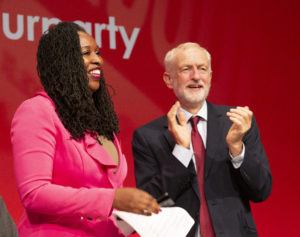
Shadow Women and Equalities Secretary Dawn Butler has used the Labour Party conference to renew her call for British banks and businesses to pay “massive” reparations for slavery.
The money should be used, she explains, to support the work of the “Emancipation Educational Trust” launched by Labour in October last year. This trust would use education to encourage “a deeper understanding of British history”, especially empire and colonialism, with the aim of telling a new national story that would help stem the rise of the far-Right.
Butler quotes Glasgow University’s decision to make available £20m in reparations to atone for its historic connection to slavery (though this money is for scholarships and grants, not Labour’s education initiative). She asserts that “other banks and businesses must follow”, and that Labour will encourage this process via “consultation hubs” in Liverpool, Bristol, Glasgow and London. It is Butler’s view that this is especially urgent at present because “for the first time in our country’s history we have a Prime Minister who the far-right regard as their leader”.
A few days ago, Martin Wolf of the Financial Times wrote of his concerns about rent-seeking in capitalism, and its corrosive effects on liberal democracy. Rent-seeking is any behaviour that aims to increase an actor’s share of existing wealth without creating new wealth. Rent-seeking tactics include using a dominant market position to control prices or prevent new entrants to the market, or using economic power to shape public policy in line with business interests.
We can draw a parallel here with Butler’s proposal, which is in effect a form of social justice rent-seeking. She wishes to use political power (the Labour Party) to convert an increasingly dominant ideology (critical race and post-colonial theories) into a share of existing wealth. Butler is full of conviction that her trust will play a vital role in combating the far-Right, but there is some slippage between “reparations” – a satisfyingly just-sounding idea considering the horrific history of slavery – and the question “to whom should reparations be paid?” After all, the victims of slavery are long dead. Which of their descendants should benefit?
Whether or not promoting the idea of hereditary guilt will help to reduce the appeal of the far-Right, it seems that the main beneficiaries will be the Trust itself, and the people who will come to be paid by it – who will no doubt share the values and worldview of the Shadow Equalities Secretary.










Join the discussion
Join like minded readers that support our journalism by becoming a paid subscriber
To join the discussion in the comments, become a paid subscriber.
Join like minded readers that support our journalism, read unlimited articles and enjoy other subscriber-only benefits.
Subscribe